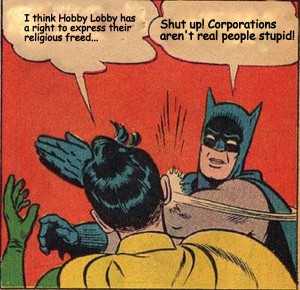I had a FB friend state that he thought that the Supreme Court opinion in the Hobby Lobby case was right. I’ve stated before that an opinion without a rationale that is based upon both facts and logic is meaningless. It is no better than an adamant goat bleating in the barnyard. That many in this country have confused the right to have an opinion with the notion that all opinions have equal value or validity. They do not. Here is why the Hobby Lobby decision is wrong.
The Hobby Lobby decision is wrong because it is based upon a fiction stacked upon a fiction stacked upon another fiction. Worst of all, it does not protect an individual’s right to their freedom of religion. It completely subverts and obliterates an individual’s right to freedom of religion.
Fiction 1: Corporations are people. Corporations are a legal fiction. Anyone who has formed a corporation knows this. They are formed by filing Articles of Incorporation with your secretary of state. Along with the Articles of Incorporation, you file Bylaws. A corporation becomes a type of mini-government with laws it made up unto itself. Part of the rationale for forming a corporation is to separate those who own the corporation from the fictional entity that the corporation is so that the individuals who own the corporation cannot be held personally liable for anything done that harms others through the activities engaged in under the rubric of that fictional entity. Put more simply, it separates the ownership from the corporation. They are entirely separate legal entities. Corporations were given a legal degree of limited ‘personhood’ so that a corporation itself could be held legally accountable for torts. Torts are damages or wrongs done to real people or other corporations caused by activities under the rubric of the fictional entity that is a corporation. Otherwise, not only would the owners be immune to liability for torts by forming the corporation, the corporation would also be immune because only a ‘person’ could be sued. Without the ability to sue a corporation, people could be immune from any wrong they ever decided to inflict simply by saying it was a corporate act. Thus, the fiction of ‘personhood’ for corporations.
Fiction 2: Corporations can hold a religious belief. As stated above, a corporation is a legal fiction. It is an entity that amounts to some dusty papers filed with a secretary of state. It is allowed to form by statute. It’s ‘personhood’ is a legal fiction that simply allows it to sue or be sued. It is not an actual person. As such, it cannot have a religion. Since it is a legal fiction, that is, not an actual person and cannot have a religion, it cannot have ‘freedom of religion’ since it can’t even have a religion. Nowhere in the Constitution of the United States is a corporation called an actual person. Nowhere in the Constitution of the United States is there a provision for a corporation to have a religion or have the right to freedom of religion. There is no constitutional basis for the notion that a corporation can object to a violation of its religious rights. Further, as stated under Fiction 1, corporations separate the owners from the corporate entity. The notion that the corporation has the religious beliefs held by the owners when they are legally separate identities is a flying leap into irrationality.
Fiction 3: Corporations ‘pay’ for insurance. Corporations do not MAKE the money that is used to pay for health insurance benefits for its workers. The workers do. Corporations are given tax breaks for providing health insurance benefits. Corporations get group purchase price breaks for purchasing health insurance for employees. A pay package offered to an employee is an inducement to get someone to work for the corporation based on the idea that they will produce something that is worth more than their compensation so the corporation can make a profit. It is how corporations compete with other corporations in an attempt to get better, more productive workers. Health insurance packages, as stated above, are cheaper when provided as a corporate purchase. This means that the ‘benefit’ of a health insurance package as an inducement to work for a corporation is cheaper for the corporation. It is actually paying less to its employee than it would if it simply paid for the value of the employees production such that the employee could buy the insurance on his/her own. But the money used to pay for the insurance is MADE by the employee producing whatever service or product he/she produces to provide a PROFIT to the corporation. The corporation is simply using the benefits provided to it to pay less in compensation by providing insurance as an inducement for that worker working for that corporation.
The decision in the Hobby Lobby case does not protect freedom of religion. It subverts and obliterates freedom of religion. Freedom of religion is the right of an actual person to practice his/her religion as he/she sees fit. It proclaims that a fictional entity can have a religious belief. And that this trumps the actual religious freedom of actual people. It makes real people have to pay extra to exercise their own actual religious freedom. They already paid for the insurance with the product of their work. Now they must pay again because the corporation making money off them, getting tax breaks for providing insurance, and getting groups rates for that insurance, won’t let them enjoy the benefit contained in the insurance policy that they already paid for with the product of their labor.

